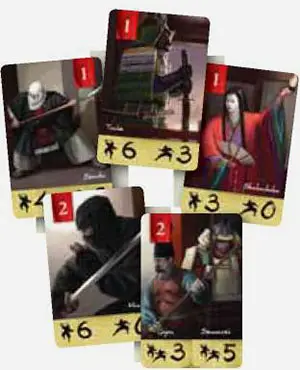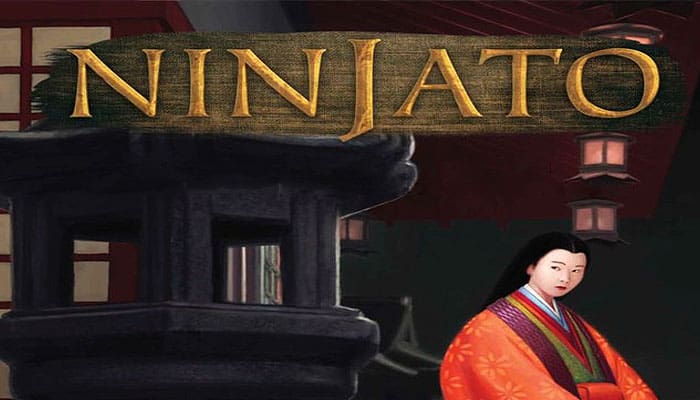
In 12th century Japan, the Minamoto and Taira clans vie for power while retired Emperor Go-Shirakawa plays his rivals against one another. One of the three factions will triumph to impose the coming social order.
In the shadow of these elite powers, a few ninja scheme to exploit the chaos. Daring raids, skill mastery, and subtle intrigue are essential to establishing one's honor. When the new era dawns, one ninja will flourish as the Ninjato, the Invisible Sword of the ruling family.
Components

-
1 Game Board
The board shows different locations for actions: the Dojo, the Sensei, the Palace, the Pavilion, and the 5 clan-controlled houses.
-
15 Clan Tokens

There are 5 tokens for each clan. These are used to show which clan controls a house and the honor level of the house.
-
19 Sensei Skill Tiles

These skills help ninja in various ways during the struggle.
-
90 Treasure Tokens

Treasures are gained by defeating guards in the houses and are used to gain envoys and spread rumors.
-
30 Rumor Cards

These cards gain bonus honor at the end of the game.
-
1 Bag
It's an enchanted bag, but the enchantment is undetectable.
-
1 Round Marker
Used to track rounds.
-
12 Shuriken (throwing Stars), 12 Wooden Markers

Each player gets 3 shuriken in a color to indicate actions and 3 markers: one to indicate turn order and two to track honor.
-
52 Dojo Cards

These cards are used to invade the houses and purchase skills.
-
21 Envoy Cards

Envoys enable you to exhange treasure for honor and gain allegiance to clans.
-
40 Guard And 20 Elite Guard Cards

Guards protect the treasures in the houses. Elite guards are more difficult to defeat than regular guards.
Setup

Place the board in the center of the table. Each player takes 3 shuriken of the same color and the matching wooden markers. Put one marker from each player in a container, then randomly draw them one by one and place them on the Turn Order Track 1 in the center of the board.
This sets the turn order for the first round. The other two markers from each player are placed at the beginning of the Honor Track 2. Players keep their 3 shuriken in front of them.
Shuffle the Guard Cards 3 and the Elite Guard Cards 4 in separate face down stacks. Draw and place 1 guard card face up on each house 5 as the sentry protecting the house.
Take a 2 and a 4 honor value Taira (red) clan token and place them on different Clan Houses. Do the same for the Minamoto (blue) clan. Place the 6 honor value Go- Shirakawa (green) token 6. Place the remaining clan tokens in a pile off to the side of the board. Mix up the Treasure tokens in the bag and place 3 treasures in each house 7, plain side up (red side face down).
Separate the 3 Hensojutsu (Disguise) Skill Tiles from the rest, shuffle them, and place them in a face down stack next to the Sensei area 8. Now shuffle the rest of the skill tiles and place them in a large face down stack next to the Hensojutsu tiles 9. Draw a number of skill tiles equal to the number of players from the large stack and place them face up in the Sensei area.
Shuffle the Envoy Cards and place 4 face up on the Palace 10 |Put the remaining envoys in a face down stack near the board.
Shuffle the Rumor Cards and place 4 face up in the Pavilion 11. Put the remaining rumors in a face down stack near the board.
Shuffle the Dojo Cards and deal 4 to each player. Turn up 3 dojo cards on the dojo and place the deck next to the Dojo 12 face down.
Place the round marker on 1 on the Round Track 13.
Yow Are now ready to play.
Game Play
In the role of a master ninja, each player practices in the dojo, learns esoteric skills from the sensei, raids clan-controlled houses to steal fabulous treasure, influences envoys, spreads rumors in the pavilion, and ultimately tries to become the most legendary ninja of the age.
In turn order, each player places 1 shuriken on a location and immediately follows the rules for that location. Once all players have placed 3 shuriken, the round is over.
The game lasts 7 rounds. Rounds 3, 5, and 7 have special scoring at the end of the round. In the end, the player with the most honor wins.

You place one shuriken each turn to immediately perform the selected action. Here, you are attacking the house with strength.
Actions
In turn, each player places 1 shuriken on the board and takes one of the following actions:
The Dojo: Take some dojo cards.
The Sensei: Learn a skill to use in invading houses.
The Clan Houses: Play dojo cards to defeat guards and take treasure.
The Palace: Discard and score treasure to take 1 envoy.
The Pavilion: Discard and score treasure to take 1 rumor card.
Shuriken
Shuriken locations remain valid even with previously-placed shuriken on them.
The Dojo
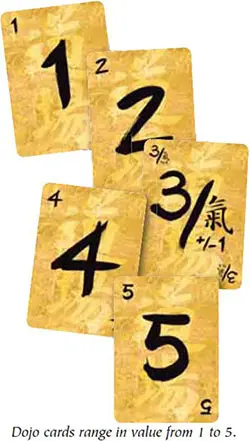
Place a shuriken here and take dojo cards in any combination from the face up cards or the draw pile. The number of dojo cards you take depends on how many dojo cards are already in your hand. If you have no dojo cards, take four.
If you have one dojo card, take three. If you have two or more dojo cards, take two. After you take all of your cards, replace any face up cards taken with new cards from the draw pile.
If there are no more cards in the deck, shuffle the discards and start a new pile.
Hand Limit
If you have over 7 dojo cards in hand, you must discard down to 7.
Always stack your shuriken on top of any previously placed shuriken on the dojo. At the end of the round, the dojo shuriken stack determines the player order in the next round.
The player with the topmost shuriken goes first, and so on down through the stack (if a player placed more than 1 shuriken on the dojo, only his top one counts).
Example: Suppose the current player order is Tom, Mike, Eve, and Brandon. During the round, Brandon places a shuriken in the dojo. Later, Mike places one on top of Brandon's. Tom and Eve do not place any shuriken in the dojo. So the stack order, top to bottom, is Mike - Brandon. The player order in the following round will be Mike, Brandon, Tom, Eve.
The Clan Houses
You invade houses to earn treasure. Each treasure is protected by a guard. The Sentry is the face up guard you know about in advance, the other guards are surprises. Each time you defeat a guard, you put a treasure on your shuriken.
Then you decide whether to leave or take on the next guard (and get another treasure). To take on the next guard, call Banzai. If you defeat all guards in a house, you will hurt the honor level of the clan that lost the house, and help the honor of the clan that will take it over.
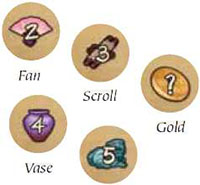
Treasures range in value from 2-5 honor. Though Gold has variable value, it is considered the most valuable treasure in houses.
The plain side of a treasure token indicates it is protected by a normal guard, the red side indicates an elite guard.
As you defeat guards, you take the plain treasures first, from least valuable on up, then the red side treasures, from least valuable on up.
Guards range in value from 1 to 5.


Here's a typical house controlled by the Taira clan. There is a 5 value Samurai turned up as the sentry guard, protecting the scroll (the lowest value plain treasure). There is an unknown guard protecting each of the other treasures-a vase and a gold.
Strength Or Stealth?
To start your attack, place a shuriken on the strength or stealth side of a house.
For strength,you must play a dojo card that is a higher value than the guard car d.
For stealth, you must play a dojo card that is lower value than the guard card.
Ties do not win!
Suppose you hold this hand of dojo cards:
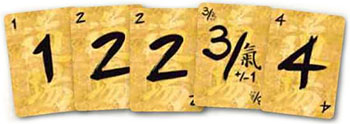
You have a good "stealthy" hand so you place your shuriken on the stealth spot  . To beat the 5 sentry, you play your
. To beat the 5 sentry, you play your  .
.
Then you take the lowest value plain side treasure, the scroll,  and put it on your shuriken. You leave the sentry on the house for now.
and put it on your shuriken. You leave the sentry on the house for now.
You decide to call Banzai, which tells another player at the table to flip up a guard-a regular guard because there are plain side up treasures in the house.
He turns up a 1 guard -you must play your  card along with your
card along with your  card as a -1 kicker to defeat this guard. You take the least valuable plain side treasure remaining, the vase
card as a -1 kicker to defeat this guard. You take the least valuable plain side treasure remaining, the vase  .
.
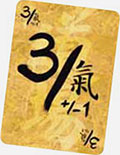
The Kicker
A 3 dojo card may be played like a normal dojo card.
But it may also be played along with another dojo card as a kicker-giving +1 or -1 to the dojo card.
You may play multiple kickers on the same dojo card.
Calling Banzai
Let's take a moment to discuss the "Banzai" decisions. Saying Banzai tells another player to turn up a guard card, you're going to attempt to defeat it.
If you call Banzai, but you cannot defeat the guard? Failure. You take only one treasure from your shuriken-discard any other treasures on it. If you decide to leave instead of calling Banzai, you take all treasures from your shuriken. In either case, leave any remaining treasures in the house.
Alarm
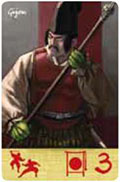
When an alarm guard is turned up, immediately draw 1 treasure from the bag and place it plain side up in the house. Then select the most valuable plain side up treasure in the house and flip it to the red side.
So an alarm increases the treasure in a house, but it also means the best treasure is protected by an elite guard card.
The gold is still in the house! Facing another Banzai decision, you know that if you go for it, you will face a guard from the elite deck, because the remaining treasure is red side up.
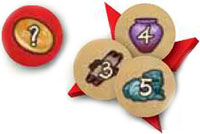
You decide to leave. You take the vase, scroll, and jade from your shuriken and leave the gold, red side up, on the house. You draw another treasure from the bag and place it plain side up in the house. The sentry recovers and stays in the house.
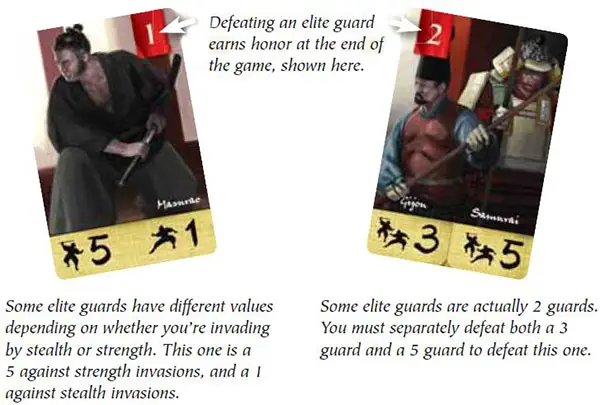
Alarm Guards
There is an alarm symbol on some regular guards.
Alarms are ignored on sentry guards.
More than one alarm guard may be drawn in a house, so an unlucky ninja may face several elite guard cards in one invasion.
Succeeding
If you defeat all guards in a house, you take all of the treasure. You also replace the clan honor token on the house with a token from one of the other two clans. The house is left empty for the rest of the round-the Sentry guard is discarded.
Failing Or Leaving
After you resolve the treasure on your shuriken (see Calling Banzai), add 1 treasure to the house, plain side up. Leave the Sentry on the house-he recovers. The house may be invaded again this round by you or another player.
Keep Defeated Elites!
All drawn guard cards are discarded after encounters except for beaten elite guards-keep those for end of game scoring.
Changing Clan Control
Each house is worth 2, 4, 5, 6 or 8 honor for one clan. Throughout the game, the control of houses changes from one clan to another. Such control changes occur when you defeat all guards in a house.
You must return the house's clan token to the pile and replace it with any token of a different clan. The house is left empty of treasure until the end of the round. No one may place shuriken there.
Envoys give you influence with a clan.
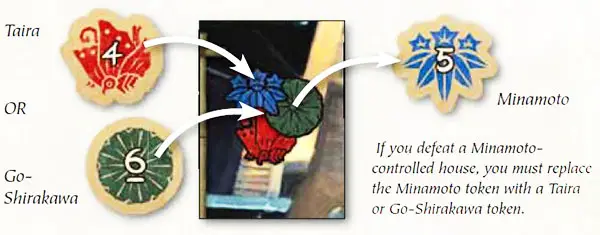
The Sensei
Place a shuriken to visit the sensei to learn one skill. Select a skill by discarding the dojo card shown on the skill tile. A ? means that you may discard any dojo card. You may learn skills from different styles. Once you learn a skill of a certain style (snake, tiger, crane), you do not have to discard a dojo card to buy more skills of that style.
Example: You discard a 5 dojo card to learn the skill Kenjutsu, a Tiger style skill. For future visits to the sensei, you do not have to discard cards to select a Tiger style skill.
You may use a skill only once per round. When you do, turn the tile face down. If you learn the same skill twice, you may use each skill tile once per round. At the end of the round, turn your used skills back up.
Most skills help you invade clan houses. The Hensojutsu (Disguise) skill is unique in that it is used during a scoring phase.
The Teachings
During rounds 1-4, there are skills available from the sensei equal to the number of players.
During rounds 5-7, the sensei only teaches one skill-the Hensojutsu (Disguise) skill- to a single student.
Resuffling Cards
During the game, you may exhaust the supply of dojo or guard cards. Shuffle the discards and start a new deck.

Gives a -2 to a dojo card.
"A puff of smoke, or a bit of breeze, going past a guard".

Gives a +1 or a -1 to a dojo card.
"The way of the open hand".

Gives a +2 to a dojo card.
"Distraction is a sword".
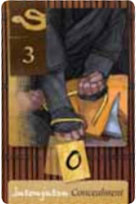
Changes the value of a played dojo card to 0.
"An artist of shadow".
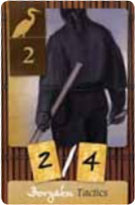
Acts as if you played a 2 or a 4 dojo card.
"Inventive devil of a trickster".
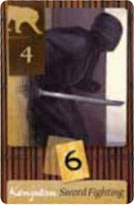
Changes the value of a played dojo card to 6.
"Speed of the blade".

Swaps 1 treasure on your shuriken for any one treasure in the house.
This can be played at any point during a house invasion, even after a failure. If a red side up treasure in the house is exchanged for a plain side up treasure on your shuriken, you must flip the most valuable treasure remaining in the house to red side up.
"The heightened senses of a scout".
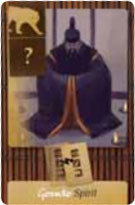
Flip any skill face up except Henojutsu (Disguise). The flipped skill may be re-used this round.
"Mind over body".
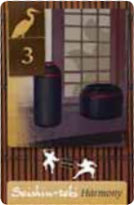
Switches your attack from stealth to strength, or strength to stealth, for the rest of the house. This can played after a guard card is revealed. The change from stealth to strength or vice versa holds for the rest of the guards in the house.
"The active mind must be clear".
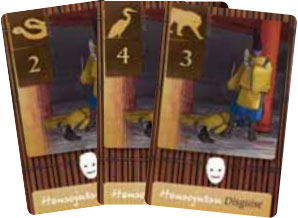
Gain 1 additional influence from one of your bribed envoys, who must have the mask symbol. If you have more than one Hensojutsu skill, you must choose different envoys.
"The illusion becomes reality".
The Palace
Place a shuriken next to the palace to bribe one envoy by discarding the matching treasures and immediately scoring the value of those treasures in honor. Take the envoy and place it face up in front of you.
During each scoring phase, the players with the most and second most envoys in each clan earn additional honor or a Rumor card. In case of a tie, the player with the oldest envoy in that clan wins.
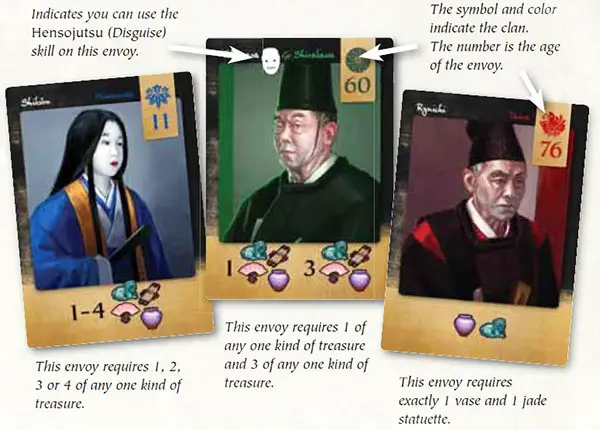
Bribing Envoys
When specific treasures are shown on an envoy, those treasures are required. For example, if an Envoy card shows a fan and a jade, you must discard a fan and a jade, immediately scoring 7 honor.
Other envoys may take various kinds of treasure and thus score varying honor. For example, an envoy might require 1 of any treasure plus 3 of any treasure of the same kind. You could bribe this envoy with 1 vase and 3 jade (19 honor), or 4 fans (8 honor), or 1 scroll and 3 vases (15 honor), etc.
Gold Is Wild
Gold may be substituted as any treasure you choose, scoring as that treasure. In the previous example, you could bribe the envoy with 1 fan, 2 vases, and 1 gold-the gold would have to substitute for a vase. This would score 14 honor.
Spent Treasure
Discarded treasure is kept in a pile off the board. If you exhaust the treasure in the bag, put the discards back in.
Hidden Rumors
After you buy a Rumor card, you may keep it face down until the end of the game. Rumor cards and Dojo cards are the only hidden player information.
The Pavilion
Place a shuriken near the pavilion to spread one favorable rumor among the nobility. You discard 1 or 2 treasure indicated on the rumor and take the rumor card. As with Envoys, you immediately earn honor from the treasure you spend. Some rumor cards may be bought with any treasure, some require specific treasure.
Rumors work best if there is some substance behind the rumor. For example, if you have one or more "Greatest Warrior" rumor cards, you'll score best if you have a lot of defeated elite guard cards.
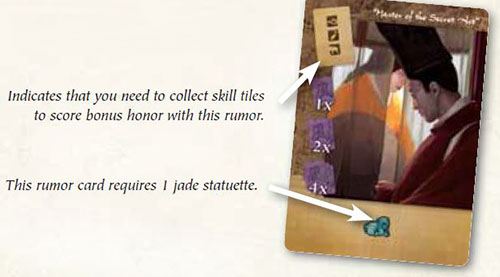
Ending a Round
At the end of each round, do the following:
Move Player Order Markers. The Dojo shuriken stack determines the player order in the next round. The player with the topmost shuriken goes first, and so on down through the stack. Players who didn't place shuriken in the dojo do not change position relative to one another. Afterwards, players gather their shuriken.
Reset Skills. Players turn all their skills tiles face up.
Reset the Sensei. Discard any leftover face up skills. Draw from the large stack a number of skill tiles equal to the number of players and place them face up. Any skills left over in the large stack after round 4 are discarded. Round 5 on, draw and place one Hensojutsu (Disguise) skill tile face up from the small stack.
Reset Cleared Houses. If a house has no treasures (all guards were defeated), draw out and place 3 treasures plain side up on the house. Next, place a new guard on the house who becomes the new Sentry. If the sentry is an alarm guard, ignore the alarm (do not add an additional treasure to the house for that alarm).
Refill Palace and Pavilion. If there are less than 4 Envoys in the Palace, draw and turn up Envoys until there are 4. Do the same for the rumors in the Pavilion.
Scoring Phases Advance the round marker to the next round. After rounds 3, 5, and 7, perform a scoring phase as shown below. After round 7, the end of game bonus scoring follows the scoring phase.
Scoring Phases
After the 3rd, 5th, and 7th rounds, there is a scoring phase.
For each clan, the first and second place players in envoy influence receive a reward. Each envoy in a clan counts as 1 influence in that clan. Ties are won by the player with the oldest envoy in that clan.
To begin, in player order, players with the Hensojutsu (Disguise) skill declare which envoy of theirs that they are targeting. Players may only choose envoys with the  icon.
icon.
Players are rewarded in the clan order shown on the round track. For example, in round 3 scoring, Go-Shirakawa is rewarded first, then Taira, and then finally Minamoto. You reward first place for each clan in order, then second place for each clan in order.
The player with the most envoy influence in a clan has a choice-score the total honor on the clan's houses or get a free Rumor card from the Pavilion. No treasure is used or scored for a free rumor. After each first place player chooses, the second place player gets whatever the first player left.
Rumors are not scored until the end of the game.
Refill Pavilion Again
Refill the Pavilion with Rumor cards after scoring phases.
End of the Game

After the last round ends, following the last Scoring Phase, do the End of Game Bonus Scoring.
The bonus scoring is for Rumors, Unused Treasure, and Defeated Elite Guards.
Rumor Bonus Scoring
Most rumor cards act as a "multiplier" for something else you collect-a full "set" is 3. If you have 1 rumor of a type, the multiplier is x1.
If you have 2 rumors of the same type, the multiplier is x2. If you have 3 rumors of the same type, the multiplier is x4. If you collect more than 3 rumors of the same type, you're starting a new set.
"Dishonorable Opponents"
These score in a unique way-there is no multiplier. If you are the only player with this type of Rumor card, each card scores 6 honor.
If two players have this type of Rumor card, each card scores 4 honor for its owner. If three or more players have this type of Rumor card, each card scores 2 honor for its owner.
Unused Treasure Bonus Scoring
You get 1 honor for each remaining treasure you have-no matter the type of treasure.
Defeated Elites Bonus Scoring
For each elite guard you defeated during the game, you receive 1 or 2 honor as indicated on the elite.
Winning
The player with the most honor wins! All other players must bow respectfully to the victor-and put away the game. When you bow, do it with humility! You are in the presence of a superior!
In the event of a tie, the player with the most envoys wins. If there is still a tie, the player with the oldest envoy (in any clan) wins!
Continue Reading
